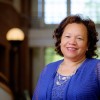This article is more than 5 years old.
I absolutely love calling North Carolina home. This captured my sentiments perfectly as my plane landed to the NC bright blue sky and awesome sunshine. I guess that is to be expected after experiencing winter in Chicago. None-the-less, the conference as a whole was filled with lots of great engaging conversation. During the BCALA retreat on Thursday we began the work of strategic planning. Tracie Hall, Deputy Commissioner: City of Chicago-Dept of Cultural Affairs and Special Events, led the group through an exercise using the Kaizen model. Kaizen combines Kai which means change with Zen which mean good or for the better. As an action plan, Kaizen focuses on improving specific areas within the organization. These strategies bring together and involve teams across the organization with a strong emphasis on linking managerial practice with and to direct services. As a philosophy, Kaizen is about building a culture where all stakeholders are actively engaged in suggesting and implementing improvements to the organization. The strategic planning process documents feedback from peer collaborating organizations, non-members, members, current and past leadership. I volunteered to work with the group of current and past leaders.
My LLAMA (Library Leadership & Management Association) obligation as chair elect of the Human Resources section was still way fuzzy. It wasn’t until my all sections committees gathering that I learned of an executive committee meeting was scheduled for later that very morning. As it turned out, the chair forgot to include me on the email invitation. At the executive committee meeting I heard program planning details for the 2016 Orlando conference. The Human Resources section has the following committees of which I get to appoint a chair by May 1st.
- Executive Committee – Charge
- Career Institute Planning – Charge
- Human Resources Management – Charge
- Leadership Skills – Charge
- Nominating – Charge
- Staff Development – Charge
As a past participant in the Association of Research Libraries Leadership Development Program, I was asked to partake in a focus group. We discussed our perceptions of value or lack of around leadership development programs for people from traditionally underrepresented racial and ethnic minority groups. Our feedback will be used to inform the design of future programs.
Also of particular interest was the ACRL Personnel Administrators and Staff Development Officers Discussion Group conversations around employee engagement surveys. The question was asked, given everything that has happened specifically with regards to budget cuts in North Carolina over the last several years, is this a good time to conduct a climate survey? The answer was really isn’t a good time. ClimateQUAL was the most widely used tool, serving as a measurer for both diversity and employee engagement. Conducting a survey like this implies leadership’s commitment to doing something. It is most important to recognize the responsibility of department chairs and their role in improving the climate. It was stressed that leaders need to be deliberate about looking for the balanced picture both within strengths and weaknesses revealed in the survey data.
There were a few in attendance who had participated in the Chronicle of Higher Ed’s “Great Colleges to Work For” survey. Attendees believed that this survey conveys a good picture of where the library stands in relation to the campus. We continued conversations around the “checking references” aspect of recruiting. Many chimed in that they had abandoned the written reference for the more personal phone conversation. The University of Delaware has started using the “Predictive Index” tool as part of the search process for non-exempt and IT positions. The focus of which is on work style preferences and behaviors. Not sure that I agree to using this as a deciding factor in the search process. I think anyone could manage to fake the attributes of a decent manager. Do you think applicants would answer honestly or would they base answers on what they think the employer wants to hear?
Some very interesting data surfaced from one of the ALA’s Diversity and Research grant projects that was showcased at midwinter. If my memory serves me correctly, it was one of the UC Berkley campuses that conducted the study. They surveyed Asian college students concerning their orientation to college life in America. How long was it before they felt comfortable on campus? What search engine did you turn to first? What did you find most difficult to navigate within college life? Just so I won’t misquote any of the numbers, I promise to post more on the survey results once I get my hands on the actual data.

1 Comment on ‘Wanda’s ALA Mid-Winterland’
Wanda, I like the phone interview idea! I’d be interested to know if they have a pool of questions that they feel gives a better overall picture of the candidate than a written recommendation! I know when I get requests from students to serve as a reference I appreciate the phone calls over the written recommendation because I can answer specific questions rather than try to guess what they want to read in my letter!